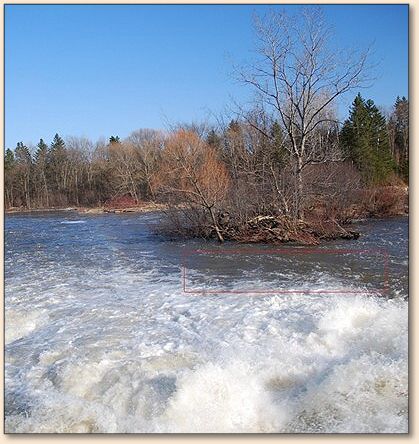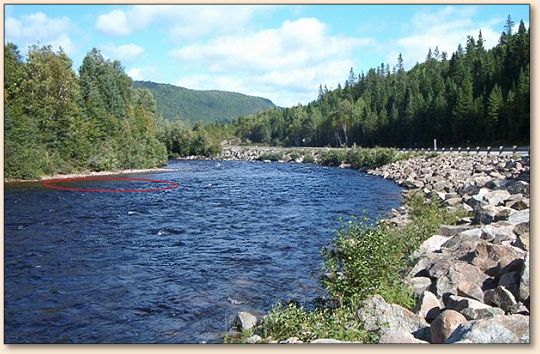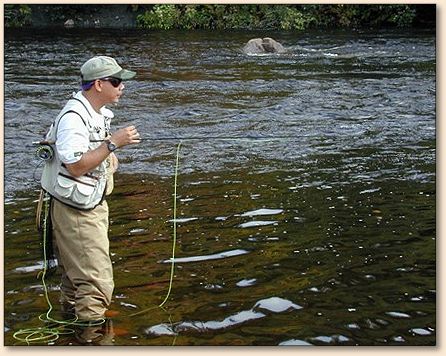Reading the Water - Part 3
(Seams)
By Chris Chin
On my home waters, there isn't a whole lot of bug activity. Over
the summer, the Atlantic salmon don't eat (just as their cousins,
the sea run brook trout). In the fall, the juvenile sea runners do eat,
but it still isn't a very rich river. There is therefore no "hatch to
match." Finding trout is an exercise in reading the river.
Some of the very best lies are found in seams. (vocabulary may
differ). For me, a seam is the line in the current where current
slides along side slower moving water. This may come about
because the main current skirts a back eddy or pool. It may also
be found on straight stretches of river where the depth changes
(such as the seam found running along the bank.)

Whatever the reason, I have found that trout like to hide there.
Here on the Left we can see a small seam upstream from the
clump of trees with the tell tale transition line of bubbles.
Thinking back (as a trout), I suppose there are good hydraulic
effects in a seam to be able to hold on station. Also, the current
sliding by brings along an occasional offering.
One of the biggest problems with fishing a seam is getting into
position to be able to do a proper presentation. I like to swing
a streamer of some sort through the current so that is slides
across the seam. Ever notice how often a trout will take on a
long down and across swing just as the fly meanders out of the
current almost straight downstream of you?
A seam that many angles seem to neglect is the transition on
the inside corner of a bend on any riffle or run.
Unfortunately, this "V" of calm water is often the VERY
FIRST place that anglers wade into!

The seam on the far side of the #26 on my home waters. In order
to fish this lie, we need a canoe or a very long cast and two different
mends!
If possible, try to setup a ways upstream from these lies and
swing an offering back through the current and into the tiny
back eddy which forms there.
One final word about seams and transition lines. By definition, it
is a zone on the river where the two (or more) currents of different
speeds are interfacing. If you're transiting across a river and you
cut through one, be ready for the effects that it will have on your
water craft. In canoes or pontoons, the effect is attenuated a bit.
However, if you have a "hard chimed" drift boat or some other
"square edged" craft, such as a John Boat, the effect can be pretty
surprising! The boat can spin or lurch or even dig in.
Seams are one of my favourite lies to fish even though many anglers
neglect them. The strategies and tactics needed to get a good
presentation to one will often challenge all of my (limited) fly
fishing abilities. On other occasions, such as fishing the "v" on
a small riffle, the presentation is the easiest cast on the whole run.

Thinking strategy – The seam running out of the #27 – Ste-Marguerite River - Quebec
~ Chris Chin, St-Severin de Proulxville, Quebec.
About Chris:
Chris Chin is originally from Kamloops,
British Columbia. He has been fly fishing
on and off ever since he was 10 years old.
Chris became serious about the sport within
the last 10 years.
"I'm a forest engineer by day and part time
guide on the Ste-Marguerite River here in
central Quebec. I've been fishing this river
for about 10 years now and started guiding
about 5 years ago when the local guide's
association sort of stopped functioning."
Chris guides mostly for sea run brook trout
and about 30% of the time for Atlantic Salmon.
"I often don't even charge service fees, as
I'm more interested in promoting the river
than making cash. I like to get new comers
to realize that salmon fishing is REALLY for
anyone who cares to try it. Tradition around
here makes some of the old clan see Salmon
fishing as a sport for the rich. Today our
shore lunches are less on the cucumber sandwich
side and more toward chicken pot pie and Jack
Daniel's."
Chris is 44 years old as of this writing. He
is of Chinese origin although his parents were
born and raised in Jamaica.
To learn more about the Ste-Marguerite River,
visit Christopher's
website. You can email Chis at: Flyfishing.christopher@gmail.com.
Our Man In Canada Archives
|

